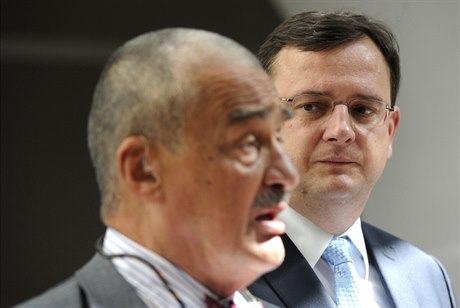The standoff between Prime Minister Petr Nečas (Civic Democrats, ODS) and the Ministry of Foreign Affairs over who should represent the Czech Republic in negotiations at the European Union level has yet to be resolved. According to Czech Position’s sources, intense negotiations on the issue are being held within the government, and the outcome should be known within two weeks.
“It still hasn’t been decided who will travel to meetings of the EU’s General Affairs Council (GAC) if the foreign minister [Karel Schwarzenberg] doesn’t attend,” the government’s state secretary for EU affairs, Vojtěch Belling, told Czech Position.
The GAC deals with issues such as EU enlargement, formulating long-term budget forecasts, and institutional and administrative matters, issues which for the most part do not fall into the sphere of traditional diplomacy. At present Schwarzenberg, who is also chairman of the government coalition party TOP 09, represents the Czech Republic in the GAC; much to his consternation, Nečas appointed euroskeptic Belling as the government’s state secretary for EU affairs at the end of September.
PM needs to keep track of EU funds
There are specific issues on which Brussels would welcome impartial and non-ministerial representation for the Czech Republic. One Czech ministries which are responsible for effective use of EU money often ignore warnings from the EU for months such issue is EU structural funds. The Czech Republic is not among the leaders when it comes to drawing these funds. For example, a European Commission (EC) report on anti-fraud measures and initiatives presented in mid-September says the Czech Republic, along with fellow slackers Hungary and Slovenia, drew only 20 percent of funds allocated to each of those countries.
The Czech ministries that are responsible for effective use of EU money often ignore warnings from the EU for months and only take corrective measures when Brussels serves notice that the validity of the grants is about to end. And the Czech Ministry for Regional Development, which is responsible for coordinating drawing of structural funds, doesn’t have effective tools to force other ministries to improve their performance.
However, according to some EC representatives, if the prime minister oversaw the process, the ministries would greatly improve their administration of applications and drawing of funds — almost immediately.
At present the practice is for the Government Office to prepare the mandate and room for maneuver for the foreign minister to represent the interests of the Czech Republic in the GAC. However, the Government Office wants powers to be able to send a representative appointed by the Nečas in the event that the Schwarzenberg is unable to attend. For example, if the EU budget is to be discussed by the GAC, the prime minister would send an official from the Ministry of Finance.
This proposed arrangement is opposed by Czech diplomats; if Schwarzenberg cannot attend the GAC, they argue, his first deputy minister Jiří Schneider — whom Schwarzenberg recently appointed as state secretary for EU affairs to counter Belling’s appointment — should attend. The diplomatic corps and foreign ministry officials are concerned that the scope of their agenda with which they are presently charged could be reduced considerably by Nečas and the Government Office.
Informal formality
Also being negotiated within the Czech coalition government is representation at informal EU meetings at which the 27 member states discuss issues from enlargement to financial matters in order to ascertain the positions of the EU 27 without the burden of official procedures. At present, Schwarzenberg also represents the Czech Republic at such meetings.
“We understand that for the informal meetings it’s not necessary to have a mandate; therefore, the Minister of Foreign Affairs, who has the necessary legitimacy, should represent the Czech Republic at such meetings,” ministry spokesman Vít Kolář told Czech Position.
The reason why informal EU meetings are of particular interest to politicians and officials from various ministries is that groups with similar interests form to influence the future allocation of EU funds and grants. Yet the Government Office argues that because matters such as the EU budget for 2014 to 2020, which influences practically all EU policies, the Czech delegation requires a mandate that should be formulated by people who aren’t limited to the interests of a single ministry.
When Czech diplomats participate in a discussion about the long-term financial outlook for the EU, first and foremost they consider how Prague’s position will influence relations with other EU member states. In such a debate, however, the Ministry of Finance is only interested in one thing: How much will it cost. Therefore, the Government Office argues, it’s essential that the Czech stance on financial planning is coordinated by a department directly subordinate to the prime minister.
According to Czech Position’s information, there is a high chance that the latter argument will win. “With the support of Public Affairs (VV) [the smallest party in the coalition government] the ODS will, despite opposition from TOP 09, implement the prime minister’s idea for the establishment of some sort of center within the Government Office for the coordination of foreign policy. The problem with this is that it would take over part of the agenda of the foreign affairs ministry,” a diplomat who requested anonymity said.
View from Brussels
The battle in Prague over who will represent the country’s interests in the EU is naturally being followed from afar by EU officials in Brussels. They generally agree that it is up each member state to decide who will be responsible for formulating the country’s agenda in EU negotiations. However, upon closer scrutiny, they admit that a solution whereby a prime minister is primarily responsible for EU issues are increasingly an integral part of domestic policies of member statecoordinating EU matters is altogether logical.
“The governing coalition made its first mistake when after the [parliamentary] elections last year it abolished the post of deputy prime minister for EU affairs. Although [former deputy prime minister for EU affairs Alexandr] Vondra [ODS] was perceived first and foremost as simply the creator of the controversial Entropa [art installation in Brussels by David Černý], in reality he got a lot of work done,” a reliable source in the EC told Czech Position.
A significant part of Vondra’s work as Czech deputy PM for EU affairs indeed involved settling disputes between ministries and forging compromises on issues relating to the EU to ensure a consistent line from Prague on the EU level. According to the EC, the absence of such a role is a hindrance.
What is more, following the ratification of the Lisbon Treaty national leaders became the key partners in member states for the EU’s political institutions. For example, now only heads of governments attend the Council of the European Union — the union’s highest legislative body also known as the Council of Ministers — whereas previously they were accompanied by their foreign ministers. This new arrangement underlines the reality that EU issues are increasingly an integral part of domestic policies of member states.





